One Powerful Word That Will Inspire a Child Who Says, ‘I Can’t’
When one of my kiddos was preschool-aged and was learning how to do something new, she would stick her little tongue out to the side and figure it out, no matter how long it took her. (And she definitely wouldn’t accept help from me.)
But one day, Bailey said something under her breath that caught me off guard – and not in a good way.
My husband was peeling carrots for dinner, and she walked up to him with a big smile on her face. “Can I do that?”
She’d never peeled anything before, so my mama heart squeezed at the thought of a sharp peeler in her tiny hands. What if she slips and cuts herself? What if she slices off a chunk of her thumb? What if we end up in the ER?!
Luckily, my husband is way more chill than I am, so he said, “Sure.”
I caught Tyler’s eye and raised an eyebrow at him, and he just smiled.
He got Bailey set up at the breakfast table with a bag of carrots and the peeler, and he gave her a quick safety lesson in Vegetable Peeling 101.
When she picked up the peeler, I felt an adrenaline surge.
But I knew enough not to hover, so I hung back in the kitchen and didn’t say a word.
Download: Get these fun coloring posters for your child to teach them the power of hard work and sticking with a problem.
And Then She Said It
Bailey stuck her little tongue out to the side and concentrated on running the peeler against the carrot.
Slow, deliberate. Safe.
I moved closer and opened my mouth to say, “You’re doing it!” But before I could get the words out, she said something under her breath that stopped me.
“I’m not good at this,” she said.
She let the peeler and carrot fall to the table, and her chin dropped to her chest.
And I just stood there, my mouth open but no words coming out.
What happened to my determined, persistent little learner? Since when did she talk down to herself?
Related: Here’s the Secret Phrase to Turn Your Kid Into an Amazing Student {Printable}
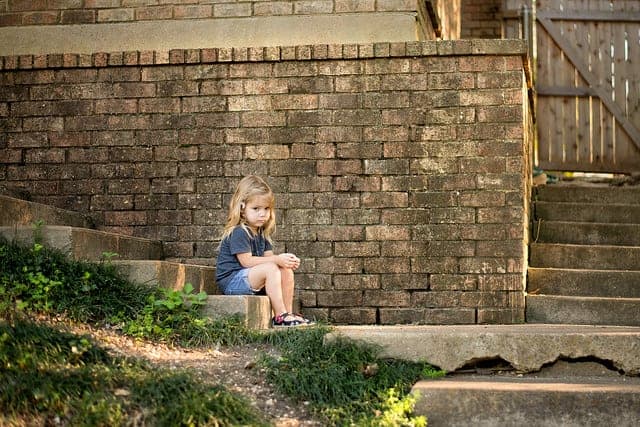
The Danger of Negative Self-Talk in Children
Many parents instinctively know that calling a child “stupid” could influence that child’s idea of how smart they are and cause them to behave differently when learning something new. But as it turns out, a child calling themselves “stupid” can have the same effect.
Let’s suppose you’re back in high school, and you’re nervous about a big science test coming up. You tell yourself, “I’ll probably fail anyway, so why even study?”
By telling yourself that, you’ve given up before the test even happened and envisioned a future for yourself where you’ll skip studying. If you do skip studying, you’ll have increased the chances that you’ll fail the test.
Instead, consider what would happen if you told yourself, “I’m nervous about the science test, but studying will help me feel more confident.” You’d be more likely to study and therefore more likely to do well on the test.
This phenomenon is called a self-fulfilling prophecy. In other words, when you declare something like this to yourself or another person, it’s enough to influence your behavior to fulfill that declaration of “truth.”
Related: 7 Surprising Ways to Help Your Kid Do Better in School, According to Science
But the Most Common Response Doesn’t Work
When kids engage in negative self-talk, it may sound like:
I’m no good at this.
I can’t do it, it’s too hard.
I’ll never learn how to read.
Because we love our kids more than anything else in the world, our gut reaction as a parent is to convince them that their words aren’t true:
You are good at this!
Yes, you can do it!
You will learn to read. I believe in you!
But have you noticed that when you try to fight your child’s negative self-talk with your own positive words, it doesn’t work?
I learned that lesson the hard way with my oldest child. It took me a while to realize that when I unleashed a slew of positive affirmations, it actually made her attitude worse. She’d furrow her brow, cross her arms on her chest, and shut herself off from me.
I’d unknowingly turned her frustration into a power struggle instead of addressing the heart of the issue.
This Is What We’re Missing
Here’s what your child is really saying when they talk bad about themselves:
I’m frustrated.
I feel bad that I made a mistake.
I’m scared I won’t be able to figure this out.
When we respond with positive affirmations, this is what our kids hear:
Don’t be frustrated!
Don’t feel bad!
Don’t be scared!
I don’t know about you, but when I’m feeling those emotions and someone responds by telling me not to feel those emotions, I don’t take it very well.
Which means the real problem is that we’re not stopping to empathize with our kids’ big and scary emotions. In that moment when your child gets easily frustrated and their confidence is shaken, they don’t feel heard.
So what can you do in that moment when you hear your sweet child saying mean things about themselves?
Say one simple word.
Get your copy now: 9 Best Mindset Posters That Will Inspire Your Child to Keep Trying

One Word That Will Flip Your Child’s Negative Self-Talk
A while ago, I stumbled on one word that helps me catch myself in that moment so I can empathize with my child and and help her move forward in a positive way:
- When your child says, “I’m no good at this” or “I can’t do it,”
- You say, “…yet.”
Adding this one word builds your child’s confidence by giving them a vision of their future where they do “get” it. They’ll make choices that will help them live up to that new “truth.”
Which means this little word is important for your child to hear, but it’s just as important for you. Because saying “…yet” will stop you from spewing out positive affirmations that will just make your child dig their heels further into the muck of negative self-talk.
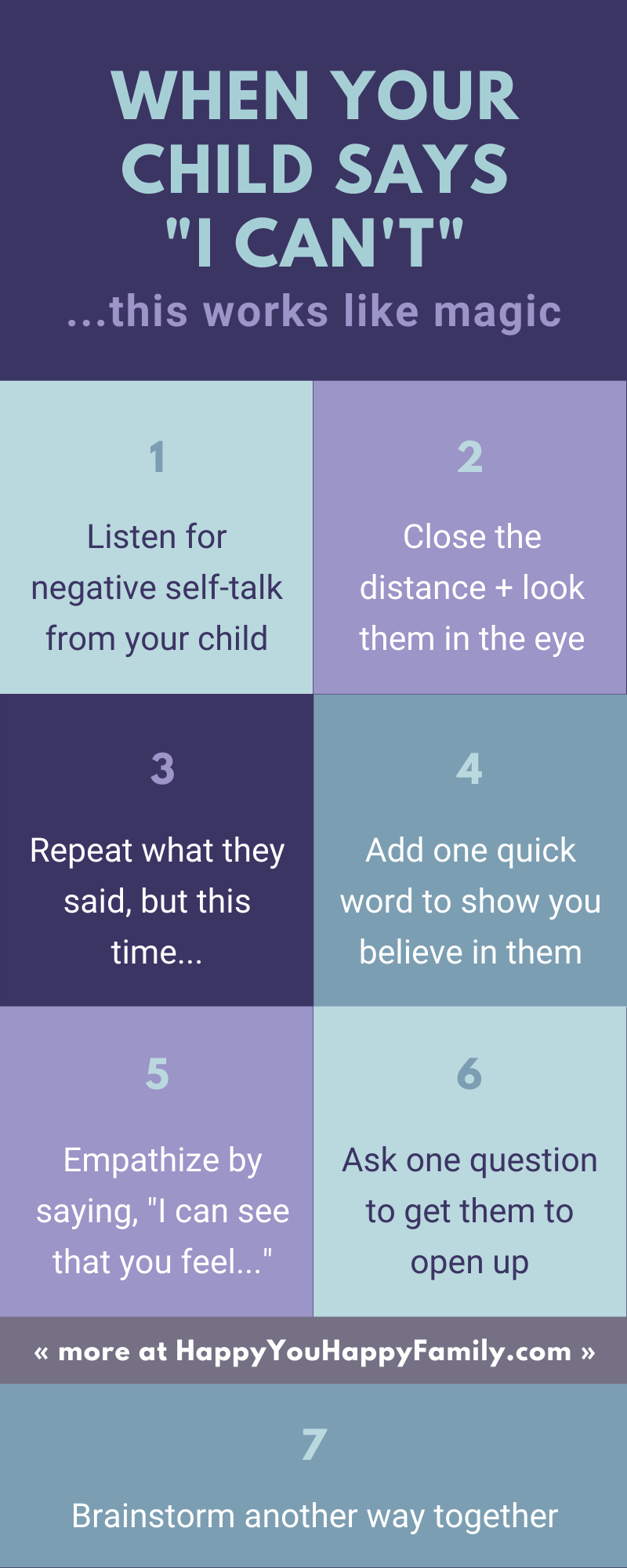
For the best results when teaching optimism, grit, and stick-to-it-iveness, you’ll want to follow up “yet” with a little more guidance:
- Yet – When you hear your child engage in negative self-talk, close the distance between you, look them in the eye, and repeat their statement but add “…yet” to the end. Depending on the statement, it may work better to say “…not yet.”
- Empathize – Let them know you hear their frustration by saying “I can see that you’re frustrated.” Or “It seems like you’re nervous that you won’t figure this out.” Or “You feel bad that you made a mistake.” You might also follow this up with a question to get them talking about what they’re stuck on, like “Can you show me the part that’s hard for you?”
- Turn it around – Now, ask your child a question to engage their problem-solving skills so they can move forward in a positive way. For example, “How can you try this a different way?” or “What part isn’t making sense yet?”
And all you have to remember is YET. Yet, Empathize, Turn it around.
Can One Word Stop Negative Self-Talk in Children?
To be clear, we can’t wave our magic mom wands and immediately stop all negative self-talk in children.
But adding “…yet” is a simple and positive response that can help nip negative self-talk in the bud and flip it into a positive mantra for your child.
On that day that my preschooler threw down the vegetable peeler and that sad little carrot, she’d said “I’m not good at this.”
I wanted to say, “It’s the first time you’ve ever tried to do this! You’ll get better! Just keep trying!” Which would have turned the whole situation into an argument with us on opposite sides.
But instead, I caught myself and said, “…yet.”
She looked up at me, and I moved forward to close the gap between us.
Bending down so we were at eye level with each other, I said, “You’re frustrated because you’re learning something new, and that’s hard.”
She nodded.
“You’re not feeling good at this yet.”
“Yeah,” she said.
I reached out with one hand and rubbed her shoulder. “How could you get better at it?”
She shrugged, and I waited, keeping my mouth shut.
After a few seconds, her eyes lit up with that determination I know and love, and she sat up straight in her chair. “I could use a knife.”
My eyes got big, and I heard my husband chuckling in the kitchen behind us. Not exactly the direction I wanted things to move in.
“You could. That’s true.” Buying myself time. “But…using a knife would take even more practice to learn than the vegetable peeler. Can you think of anything else that would help you with the peeler?”
She tilted her head to one side, thinking. “Can you show me again?”
I smiled and picked up the peeler. The power of yet.
Print These Coloring Posters to Change Your Kid’s Mindset
I’ve tried countless parenting techniques to encourage a growth mindset in my kids – some of them total duds.
But I wish I’d created these special mindset posters much earlier because the results have been fast and impressive with my grade-schooler and my preschooler. (Even my toddler repeats the growth mindset mantras she hears from her older sisters!)
Thanks to these mindset posters, my kids have internalized powerful, positive mantras to remind them that hard work and sticking with a problem will help their brains grow – and will help them become the people they want to be. (Check out the science behind these growth mindset posters that makes them so powerful with kids.)
Download your own set of mindset posters here, and you’ll unlock your child’s true potential for working hard, not giving up, and learning from their mistakes.
Get your copy now: 9 Best Mindset Posters That Will Inspire Your Child to Keep Trying
Want More?
If your child struggles with negative self-talk, they may have a fixed mindset when it comes to learning new things. Get more tried-and-true tricks to nurture a growth mindset here:
Your Turn
Have you found any helpful tricks for responding to negative self-talk in children? Share in a comment below!

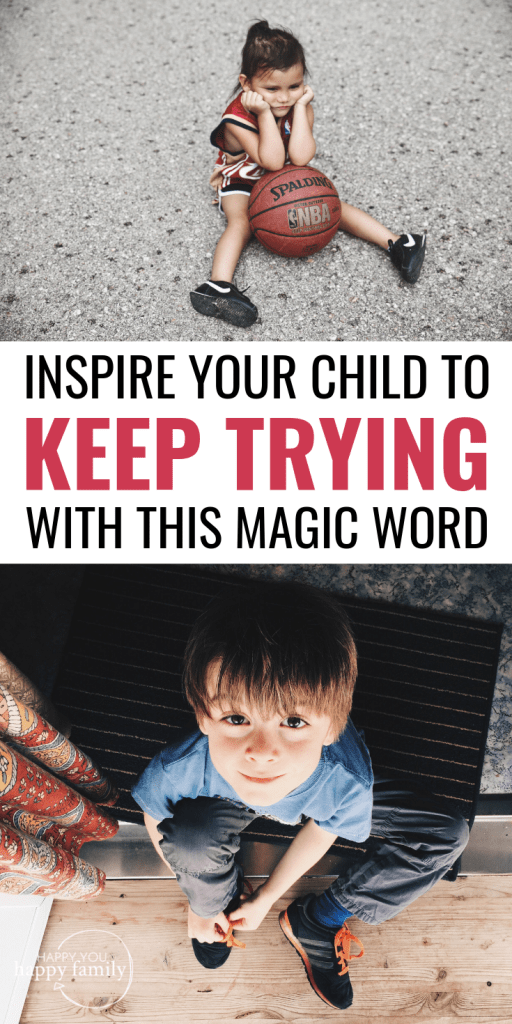
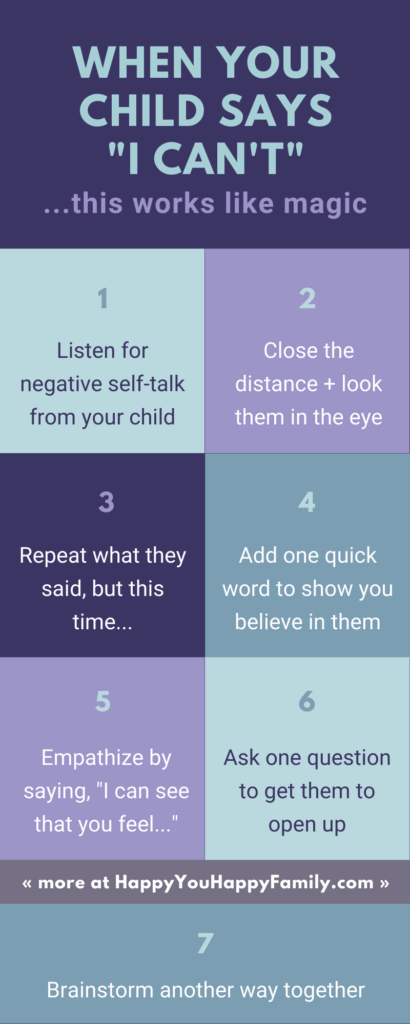

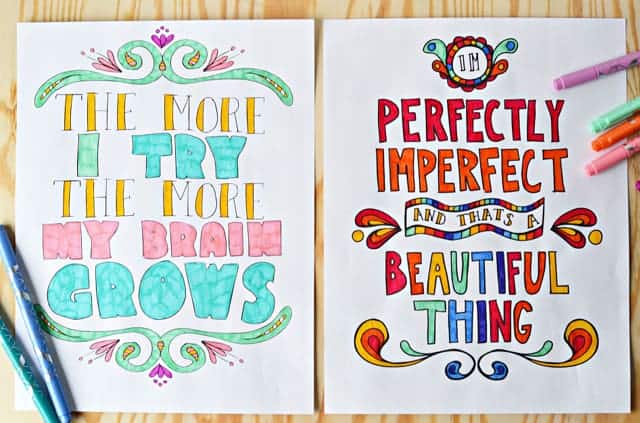
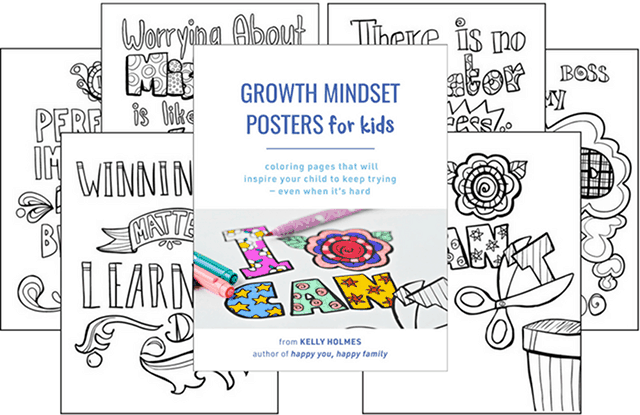
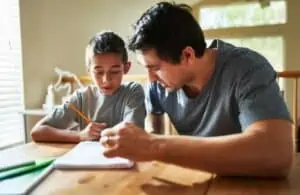



Genius.
Glad to hear this resonated, Reena!
I love this post! We’ve been doing this at home and the funny thing is that my husband taught it to me a while back and now we use it with our girls. It’s so powerful! And I love the three steps you suggest :)
Also the new version of the brain is a muscle pientable is beautiful! We did the first one and it has helped so much. I will do this new version with my girls this weekend. Thank you!!
Erika, how cool that this is already a tried-and-true trick in your family! And I’m glad you like the new coloring page. A friend designed it for me since as you could tell from the last version, my design skills are seriously lacking. ;) Enjoy your weekend!
This is such a great post! It is so awful that kids are now involved in negative self talk. Self love is such an important topic to us and it’s great there are words that can be replaced and fixed to your children to help them have a greater self confidence! This definitely resonated with us.
Once again, just the message I need this week. My son is struggling to learn to ride his bike, and nothing I was saying was helping. This. This is going to be how I respond tomorrow.
Before reading the body, I knew the answer. That is because I have been using this for YEARS successfully! It makes ALL the difference in the world.
As I was reading this article, I thought of what I say, not yet! So I am glad to hear I am on the right track. This gives my children confidence to keep trying and pride when accomplishing.
thank you thank yu for this!! I am so happy to have tools to help my four year old Mabel navigate childhood. <3
What to say when 7yo says, I’m dumb.” or “I’m stupid.”?
Maybe by responding with “…yet/not yet.” the rest of the time, it will decrease how often you’re child feels that way?
Something that helps my kids (in general, maybe not specifically when they’re feeling negative) is when we point out when they learn something new or can reach something that used to be too high. “I remember when you couldn’t do that, and now you can!”. We celebrate those moments and it helps them see themselves progress.
Kelly, I would like your permission to put a link to this article on my website. I think the information in it is so very adaptable to adults also and I will be making that comment with the link and encouraging readers to read you post. It;s truly excellent.
Love this! Thank you I will try this with. my son the next time he engages in negative self talk.
I really need to try this! I have a 3 year old who talks negatively about herself and you’re 100% right – if I try and encourage/be positive it turns in to an argument or makes her more upset. I think this is a great way of empathising and opening the conversation.
Terrific post! It’s wonderful to see how we can simultaneously help our children build resilience while also learning (and in turn, teaching) lessons in empathy.
This is a great way to Manage it! Thank you for this wonderful post.
How do I join the news letter?
I have believed the self-fulfilling prophecy theory for many years, but I had never heard of using “yet.” What a wonderful idea! I am printing this out so that I can remember to start using this in my conversations with my children. I really think my dyslexic daughter will especially benefit from making this thought process a habit. Just in time for back to school and new 3rd grade challenges for her.
Great post. My four year old often says “I’m no good at this…I’m no good at abuthing”. It breaks my heart. I will definitely be trying this x
A simple word but very powerful…Thanks Kelly for sharing this magical word. I am definitely going to try this with my 3 year old.. I believe a word of encouragement can bring a drastic change in the overall personality of young kids. Negativity is everywhere, but it is our efforts with these shining buds to make them feel positive.
Thank you once again!!Loved reading it!!
I Love this!! My little one has been doing this for the past 3 months. I been wondering how to Stop this. I’m going to try this. THANK YOU!
This is a great post. It is important that we teach kids to be positive and always have the feeling of I can. This way, kids have positive outlook in almost everything.
THANK YOU for this wonderful post! We recently discovered that our eight year old is dyslexic. One of the many things I, as his mother and teacher, have been trying to figure out is how to help him through the many “I can’ts.”. This post is being printed for my files for frequent reading!
This is brilliant! Just hits home. Indeed, negative self-talk is detrimental in our children. This opened my eyes to the more grave consequences if these things are not flipped over. Thank you and just THANK YOU for writing this! I thought of a lot of scenarios where my child and other kids I know exhibited this and I am just so happy I stumbled upon this article. Now I can be more effective in addressing their negative self-talk. Yet, Empathize, Turn it around.
This is a very good piece of advice. My son is at the stage where he is trying to do everything by himself and I hear a lot of “I can’t do it”. I will keep your phrase in mind next time he says that.
What should you say if they say it’s too hard they can’t do it. Do you agree, it is hard but you can do it just keep trying . Or do you disagree and say it’s not hard you can do it just keep trying.
Great video that I share with my students – even my 5th graders love it.
Sesame Street – “The Power of Yet”: https://youtu.be/XLeUvZvuvAs
I have three children that struggle with this on different levels. They have picked it up from each other. Thank you for the tip! I hope it helps my kids.
Thank you for this! My three-year old granddaughter was trying to draw and I hear her say, “I’m no good at this.” I was speechless and could think of absolutely nothing to say on the spur of the moment. I figured it was better to say nothing than to say something that would make things worse. If this happens again I will be prepared with “yet” to remind me of your helpful suggestions.
Oh my gosh so good! I do something similar with my piano students. When they say, “I’m not good at this” I say, “I think you mean that you’re getting better at it!”
I’ve recently been trying to get my daughter to say, ‘this is hard for me’ rather than ‘I can’t do it’ or ‘I’m so bad at this.’
When my son Matty says ‘I can’t do this. ‘ even he haven’t tried it yet.. I will always encourage him to try a little and See if he really can’t do it. You will never know how to do it unless you try ?
Just stumbled on your post, and I love it! Thank yo for sharing!
I love this! When my kids talk negatively, I start singing “I will get back up again” from the “Trolls” movie or I’ll play like I don’t know and ask them “what’s that song that poppy sings? How does it go?” And they’ll smile and start singing it while trying again. It worked amazingly when my youngest daughter was 4 and was learning how to ride without training wheels! We tried for 3 days, and any time she would tip over she would start singing it and we would try again. It seems to be pretty effective. I’ve even overheard them do it for each other to encourage each other while playing and while doing their homework! But I’ll definitely be adding these in too!
Thank you
Thanks for sharing! This is so applicable for so many things. Lately, my 4 year old wants to do everything a big kid can and it has been hard to keep saying you’ll have to learn, but reminding him of what he’s already learned.
I’ve experienced this scenario with my brother, but in a grown-up way. I can’t wait to try this response to his negative self-talk because my heart’s desire is to be an encouragement to him. Thank you.
You should turn this into a children’s book. That would be amazing!
You should make these posters into a children’s book. It would be a very touching story of these posters put in action. I would be first in line.
Yet …such good advice!
Got your email about this topic today and it could not have come at a better time. This is exactly what I am struggling with at the moment! Thank you for the helpful tips :)
I needed this so much. Thank you! I fell into all the same positive encouragement traps too and kept getting frustrated because it made it worse. This is going to help so much. :)
To go along with the positive posters…. a phrase we changed in our house is “Practice makes Progress” that way my daughter wouldn’t get the misconception that she’ll be perfect if she practices. She’s in soccer and it was important to me that she wouldn’t think she wasn’t “perfect” because she didn’t get a goal that day. As long as she played her best and was a good team player and made “progress” in her skills that was more important to me. :)
I often (very often) struggle with the right words to say, so I am LOVING these emails. It’s really helping me stay calm when we have a situation that needs delicate care. Thank you so much!
Great post! At least I know I’m not the only parent who has handed a vegetable peeler over to a preschooler…unfortunately I missed the safety talk and mine sliced a decent chunk of his thumb right off… Mom fail!
Great post! At least I know I’m not the only one who has handed a vegetable peeler over to a preschooler. I however failed to include the safety talk and mine sliced a good portion of his thumb right off… Mom fail!
Kelly that is perfect. I love it. Thank you.
Thank you Kelly :) because I love my son so much, this is going to help so much for him to continue to grow and become more confident……..simple yet for me life changing.
Thank you for sharing :)
Hi, I loved this so so so much and here is
why, I’m 22 years old and have a younger brother who is about 9. My mom is very intelligent patient kind hearted mom, however she is very busy. So the job of caring for my brother fall most times on me. My mother has recently started asking me to involve my brother in more household shores.being the youngest and last of the family he was not or rarely participating. However now I’m often left alone to face his outburst whenever I give him any small task, I sometime get him to do the job even when he is frustrated however sometimes I can never do that , reading your post I noticed that the times I got him to do work the conversation was more along the lines of:
“ I can’t do this”
“ let me teach you how”
“I still can’t do this”
“ some day you will be able to”
“ but I can’t do it now !”
“ how do you want to do it now?”
Funny enough the answer was “ use a knife” ? but that’s a story for another day.
Bottom line I frequently get so frustrated with him and hold my self strongly form lashing out and sometimes he magically does the work quietly. And I think I know why now! , thank you so much for this post it was such an eye opener.
Plus whenever I personally screw some thing up my mom’s reply is always:” your still learning “ , or after she corrects me she says:”now you know”.moms are such amazing creatures ?
Sorry for such a long replay
I stumbled across your post and loved it! I am a Mimi of a two-year-old and a one-month-old and I want to be a Mimi that is encouraging, loving and fun. My Littles live five hours away so I don’t see them all the time, but when I do I’m fully immersed. I haven’t run across this situation yet but I’m very thankful to have read your post and have tucked it away to use when I need it.
This is beautiful and just what I needed to hear. I have a 6 year old who has a lot of big changes right now. She is learning to read and is starting to tumble in her cheer group. I constantly hear “I can’t “, before she even tries. I understood that she was overwhelmed, but I would immediately say, “you can do this”. She would start crying at that point. Now I understand why. Thank you for putting it in perspective.
This was a great take on how to turn this around — I deal with this a lot at home, and I just want to help. So much patience is needed, and this can help move the conversation along in a positive direction
Literally 15 minutes ago, my 6 year old son was telling me he couldn’t do his math. I knew he could, so I said-You totally can! You’re great at math! He pouted in return, obviously frustrated. 5 minutes after that, while doing art, he told me-You know what [art teacher] says when we can’t draw something? She says we can’t do it, YET!
I thought how wonderful his teacher was. Then I read this and realized that HE was teaching me and I didn’t even realize it! Wow.
I LOVE this article…
I wonder, my 4 year old is saying a lot of “I can’t do it” and “I don’t know how to do it” as an excuse to not pick up his toys or do soemthing he feels is tedious and will stop him from playing.
I don’t want to encourage this kind of thinking, so I always explain: “This is something I’ve seen you do before, so I know you know how to do this. Is it that you can’t, or you won’t?”
I was wondering if you have any advice. With the pandemic and all, we moved to a small town, he’s changing schools so I know it’s a difficult time for him, but I don’t wnat him to convince himself he can’t do stuff.
Thank you so much for this!
Insted of fixing and offering solutions, suggest an alternative view. A choice – ‘I wonder if there is something different we can do with those thoughts’? The goal of this step is to simply help kids recognize that some thoughts, while perfectly normal, can cause frustration, sadness and a general “not good” feeling. It also creates a problem solving mindset. To deepen this skill, you should start to play chess together! Chess provides ample mental exercise to both the parts of the brain which aggravates thinking and memory. It is also said to improve concentration and focus. A study of Pennsylvania sixth-graders found that students who had never before played chess improved their memories and verbal skills after playing. Chess diagrams are always a great idea to practice strategy moves or solve movement problems and better memorize. Book by Maksim Aksanov is a great choice (net-bossorg/chess-puzzles-for-kids-by-maksim-aksanov). Of course it’s avaliable in electronic format, so you can have it on your phone or tablet.
Thanks for this. I think I was on the right track. When my daughter said she couldn’t do this or was hopeless at that, I’d say ‘you’re only 6/ 10/ 15 (whatever age), you haven’t had any practice, no one would expect you to be able to do it’. So it is similar but ‘yet’ is much simpler and quicker.
What if the child says, “I’m a bad sister”? We never tell our children that they are “bad” or even that what they did was “bad”, but my highly sensitive 4 year old sometimes will say that she is “bad”. It seems to me that she feels bad about something she did and she is over-generalizing. I don’t know how to explain to a 4-year-old that she is not bad. Any suggestions welcome!
Who might she be getting this from? Pre-school, TV, friends? It’s important to know the influence and deal with that part of the equation, and then counter with the truth that that’s a wrong idea and replace it with the truth.
Great advice. My Granddaughter (6) often says “I can’t” and I think this may be a great move to help her. My Grandson (8) has recently started saying “I’m so dumb”. What can I say to help, instead of “no you’re not”. ?